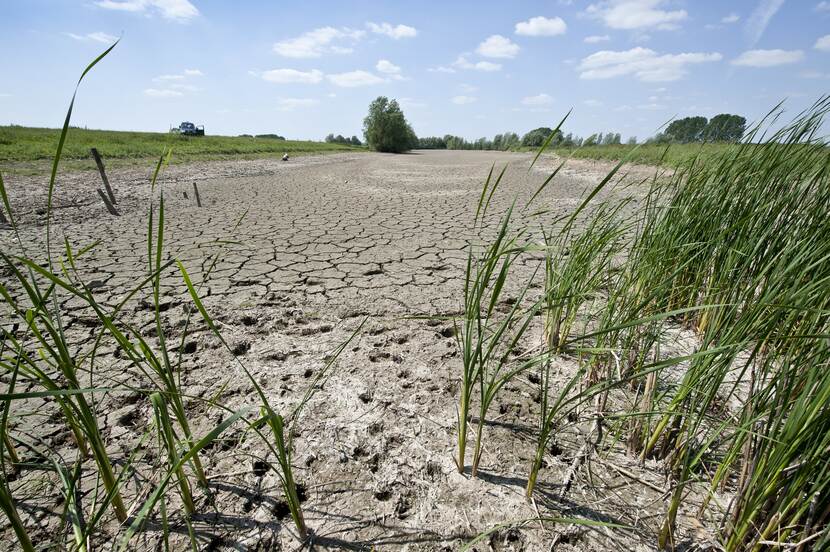Delta Programme 2020, continuing the work on the delta: down to earth, alert, and prepared
It is of paramount importance for the Netherlands to continue to prepare properly for the impact of climate change. The key challenge is to take full account of water issues and the changing climate in all spatial planning efforts. This is what Delta Programme Commissioner Peter Glas states in Delta Programme 2020. Peter Glas: ‘Climate-adaptive and water-resilient construction and development should become the “new standard”.’
On behalf of the Cabinet, the Minister of Infrastructure and Water Management presented Delta Programme 2020, prepared by the Delta Programme Commissioner and featuring concrete measures in the fields of flood risk management, freshwater availability and spatial adaptation, to the House of Representatives today.

Climate-proof and water-resilient spatial planning
One of the goals of the Delta Programme is to ensure that the Netherlands will be as climate-proof and water-resilient as possible by 2050. With a view to the major spatial taskings entailed in housing and the energy transition, the Delta Programme Commissioner is requesting that additional attention be paid to the interconnection between water and spatial planning and is urging all the governments to substantiate this in their environmental policies. The Netherlands is a small country and every tasking involves a major claim on the space available. A case in point is the comprehensive housing tasking. That is why it is vitally important to have the Delta Programme goals – with respect to flood risk management, freshwater supply, and spatial adaptation – incorporated into the environmental visions of the central government, provinces, and municipalities, and to factor in these goals in the preparation of actual projects in the physical domain. Furthermore, it is essential for the governments themselves, as principals, to set a good example and to encourage residents and the business community to do their share.
Delta Programme progress
Delta Programme 2020 shows that, in every respect, the planned measures are on schedule. Last year, the Netherlands demonstrated its increasing capability of coping with prolonged drought, which can, in part, be attributed to the measures that have been implemented over recent years. However, the unexpectedly long duration of the 2018 drought has resulted in salinisation in Lake IJsselmeer and sharply falling groundwater levels, in particular at the Elevated Sandy Soils and in the Southwest Delta. At the end of 2018, the Minister of Infrastructure and Water Management set up a temporary Drought Policy Platform. Its first recommendations have already been addressed within the Delta Programme. Furthermore, a sum of 7 million euros from the Delta Fund has been set aside for urgent projects. Major efforts need to be expended by all the parties involved to retain water during periods of wet weather, in order to have a sufficient supply available in times of drought.
Virtually all the municipalities have conducted stress tests, mapping out their vulnerability to extreme weather. Several regions have already embarked on risk dialogues with stakeholders regarding the strategy to be pursued to resolve bottlenecks. The central government has allocated a supplementary incentive of 20 million euros to the short-term substantiation of the Administrative Agreement on Climate Adaptation. These additional funds enabled the launch of several projects this year.
Based on current insights, dyke improvements need to cover a weekly average of one kilometre up to 2050. Several projects were rolled out in 2019, including the preparations for the improvement of the Markermeer dykes, whilst the Prins Hendrik Sand Dyke project and the Ringdijk Watergraafsmeer innovative dyke improvement project were completed. The average pace of the dyke improvements is in line with the progress required to have the primary flood defences meet the new standards by 2050.
Review
Developments in fields such as the climate, demographics, or the economy may dictate a change of course in the Delta Programme. That is why the Delta Decisions and Preferential Strategies set out in Delta Programme 2015 are subjected to a systematic review once every six years. The first review process commenced in mid-2018. Next year, it may result in proposals for amendments, to be presented in Delta Programme 2021.
An interim finding of the ongoing review is that the Delta Decisions and Preferential Strategies set down in 2014 hold good. Up to 2050, they constitute the proper points of departure for rendering the Netherlands safe, climate-proof, and water-resilient. It seems that in 2021, the review will dictate minor adjustments; after 2050, the taskings may change radically, because at that time, the sea level could be rising at a rate faster than was factored in by Delta Programme 2015. In the years ahead, the change of course that might be required after 2050 will call for a joint fact-finding process in order to develop shared knowledge, garner social commitment, and make collective choices.
Sea level rise
Over the past year, significant steps have been taken towards the development of a Sea Level Rise Knowledge Programme. The Netherlands is the safest delta in the world and seeks to remain so in the future. For that reason, the Delta Programme partners are working on this Knowledge Programme, in collaboration with research institutes and representatives of the business community. The goals set for the programme include reducing the uncertainties regarding the developments on Antarctica and the associated rise in sea level; mapping out the extent to which the current Delta Decisions and Preferential Strategies are tenable and expandable; and exploring potential action perspectives for the distant future. The Knowledge Programme will run until 2026. The outcomes will be used in the second six-year review of the Delta Programme. This will enable an adaptive response to a potentially accelerated rise in sea level beyond 2050.
Delta Fund
For the period 2020-2033, some 17.9 billion euros will be available in the Delta Fund, which brings the annual budget to an average of nearly 1.3 billion euros.